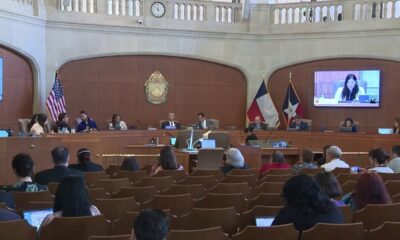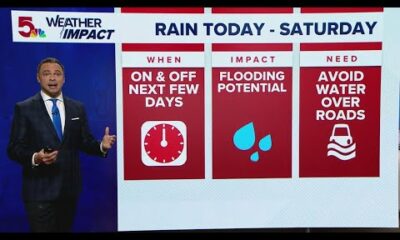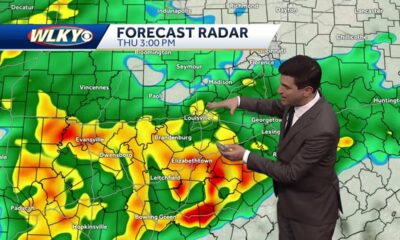News from the South - Alabama News Feed
Get rid of FEMA? Trump-appointed group to look at shifting disaster response to states • Alabama Reflector
Get rid of FEMA? Trump-appointed group to look at shifting disaster response to states
by Jennifer Shutt, Alabama Reflector
January 27, 2025
WASHINGTON — Governors and state legislatures may have to bolster their natural disaster response and recovery efforts in the coming years as President Donald Trump looks for ways to shift the federal government’s role onto states.
Trump, who proposed doing away with the Federal Emergency Management Agency altogether last week, has since established a 20-member committee via executive order to review the agency and propose ways to overhaul its work.
The fate of the National Flood Insurance Program, managed by FEMA and relied on by more than 4.7 million homeowners, will also be up in the air as the process gets underway.
“I think, frankly, FEMA is not good,” Trump said in North Carolina on Friday. “I think when you have a problem like this, I think you want to go and — whether it’s a Democrat or a Republican governor, you want to use your state to fix it and not waste time calling FEMA.”
Trump said he planned to recommend that “FEMA go away and we pay directly — we pay a percentage to the state.”
“But the state should fix this,” Trump said. “If the state did this from the beginning, it would have been a lot better situation.”
‘Full-scale review’ for FEMA
Trump’s executive order states that “Americans deserve an immediate, effective, and impartial response to and recovery from disasters.”
“FEMA therefore requires a full-scale review, by individuals highly experienced at effective disaster response and recovery, who shall recommend to the President improvements or structural changes to promote the national interest and enable national resilience,” the executive order says.
Homeland Security Secretary Kristi Noem and Defense Secretary Pete Hegseth will co-chair the 20-member group. The White House did not respond to a question as to when Trump would name the other members.
The council is supposed to release a report later this year comparing FEMA’s response to various natural disasters with how the state affected by the emergency responded. The report is also expected to include how states responded to natural disasters before then-President Jimmy Carter signed in executive order in 1979 establishing FEMA.
U.S. House Speaker Mike Johnson said during a press conference Monday that he supports reviewing how FEMA operates, but he stopped short of eliminating the agency.
“In my experience, it is very often the case that local workers, people who are working through FEMA, do a pretty good job,” Johnson said. “But often, it’s the leadership at the top that can affect the outcome of how a disaster is handled.”
Johnson said no department or agency should be considered out of bounds for evaluation as Trump looks to “make the government more efficient and effective” and Republican lawmakers look for ways “to limit the size and scope of government.”
“FEMA has been a partner, but they probably could be a better partner,” Johnson said.
Let states run response
Republican U.S. Sen. Lindsey Graham said Monday that Trump’s preferred approach would be to let states run their own emergency response and be reimbursed with federal dollars.
“FEMA is frustrating at times,” Graham told reporters in Columbia, S.C. “I’d like to make it easier to help people with disaster relief.”
Graham expects anything that comes out of the study to land somewhere in the middle — not completely eliminating the federal agency but cutting through some of the red tape.
“If you want to look at FEMA, reshape FEMA, to make it more effective, count me in,” Graham said.
Congress appropriated $25.3 billion for FEMA in the last full-year spending bill for the agency, which was $72.9 million less than its previous funding level and $267.7 million less than then-President Joe Biden’s budget request, according to a House GOP summary.
Lawmakers provided an additional $29 billion for FEMA’s disaster relief fund in an emergency spending bill that Congress approved in late December.
Democratic Governors Association national press secretary Devon Cruz wrote in a statement the GOP was “floating dangerous ideas.”
“When natural disasters hit, Democratic governors have been a leading example of putting politics aside, and helping families rebuild and recover,” Cruz wrote. “Now, Donald Trump and Congressional Republicans are shamelessly politicizing disaster aid, and floating dangerous ideas that would make it harder to help families rebuild their homes, schools, and communities. This is just the latest example of the growing contrast between Republican-led dysfunction in D.C. and Democratic governors getting real results in their states every day.”
The National Governors Association declined to comment on how the potential changes would affect states and their budgets. The National Conference of State Legislatures and Republican Governors Association did not respond to requests for comment.
Billions in federal dollars sent to states
FEMA has an interactive state-by-state breakdown of how much the federal government has spent on natural disaster response and recovery since 2017, though it doesn’t include the emergency funding for COVID-19.
The webpage shows how much FEMA has spent to help each state or territory recover from emergencies, as well as how much the departments of Agriculture, Defense, Health and Human Services, Housing and Urban Development, Interior and Transportation have spent.
The webpage shows the departments and agencies have allocated about $250 billion on the natural disasters covered in the data, with significant amounts going to red states that backed Trump in the presidential election and are predominantly represented by GOP lawmakers in Congress.
Speaker Johnson’s home state of Louisiana, for example, has been allocated $19.3 billion in funding, with $11.5 billion of that from FEMA.
South Dakota, home to Senate Majority Leader John Thune, has been allocated nearly $400 million from the federal government, with FEMA accounting for $275.6 million of that total.
Florida, which has borne the brunt of several hurricanes and tropical storms during the years covered, was allocated $29.5 billion in federal disaster assistance, with $19 billion of that from FEMA.
South Carolina Daily Gazette senior reporter Jessica Holdman contributed to this report.
Last updated 4:15 p.m., Jan. 27, 2025
Alabama Reflector is part of States Newsroom, a nonprofit news network supported by grants and a coalition of donors as a 501c(3) public charity. Alabama Reflector maintains editorial independence. Contact Editor Brian Lyman for questions: info@alabamareflector.com.
News from the South - Alabama News Feed
Alabama immigration enforcement bill gets approval from 2nd House committee
by Ralph Chapoco, Alabama Reflector
April 3, 2025
An Alabama House committee Wednesday approved an immigration bill that had already received another committee’s approval earlier in the session.
The House Judiciary Committee approved HB 7, sponsored by Rep. Ernie Yarbrough, R-Trinity, which would give local law enforcement the authority to enforce the country’s immigration laws.
“There are no new laws added,” Yarbrough said to committee members during the meeting. “It simply allows that partnership to take place just to address safety in our communities.”
GET THE MORNING HEADLINES.
Judiciary approved the bill about six weeks after the House Public Safety and Homeland Security did so in February. It is unusual for a bill to go through two committees before going to the floor of the House for a vote. The last major legislation to get routed through two House committees was the bill legalizing medical cannabis in Alabama in 2021.
The current bill, largely unchanged from last year, allows local law enforcement, such as sheriff’s offices and police departments, to enter into agreements with federal agencies to arrest and detain people who are not legally authorized to reside in the country.
Once in custody, deputies and police officers must then attempt to determine a person’s immigration status and get the help of an interpreter to determine someone’s nationality.
If a person cannot provide documentation proving they are eligible to live in the country, local law enforcement may then reach out to a Law Enforcement Support Center (LESC) to get information about a person’s immigration status.
The bill states that people cannot be detained solely because of their immigration status unless authorized by Immigration and Customs Enforcement, and that sheriffs’ deputies and police departments will verify that a person has an arrest warrant within 24 hours of the person getting detained.
Law enforcement must also obtain documents to verify a person’s immigration status, bet that a passport or a permanent resident card.
House Judiciary Committee members approved an amendment making a few of the requirements optional. A previous version required the Alabama Attorney General’s Office to publicly name any agency failing to comply with provisions in the legislation and notify the governor’s office.
The updated language gives the AG’s Office an option to inform the Governor’s Office.
Another amendment also allows, but doesn’t require, local law enforcement to report the total number of people arrested and the number of foreign nationals they take into custody as well as the inquiries they make to the LESC.
Immigration advocates who spoke at a public hearing on the legislation in March said the legislation is creating fear among immigrant communities. That, they said, would lead to mistrust toward law enforcement and increased school truancy for children of immigrants who are afraid to attend school for fear of their parents being deported.
Democrats on the House Judiciary Committee criticized the legislation.
“What country do we border in Alabama?” asked Rep. Penni McClammy, D-Montgomery during the committee meeting Wednesday.
Yarbrough said that every state is connected, and that people travel.
“Each state doesn’t have a physical wall, so people travel from state to state,” Yarbrough said.
YOU MAKE OUR WORK POSSIBLE.
Alabama Reflector is part of States Newsroom, a nonprofit news network supported by grants and a coalition of donors as a 501c(3) public charity. Alabama Reflector maintains editorial independence. Contact Editor Brian Lyman for questions: info@alabamareflector.com.
The post Alabama immigration enforcement bill gets approval from 2nd House committee appeared first on alabamareflector.com
News from the South - Alabama News Feed
New Tariffs Could Raise Car Prices | April 2, 2025 | News 19 at 10 p.m.
SUMMARY: A 25% tariff on foreign cars and auto parts is set to take effect at midnight, potentially raising prices for consumers. While current inventory and cars already at U.S. ports will remain at existing prices, future pricing remains uncertain. Dealerships in North Alabama say it’s too early to know the full impact, but warn that repair costs may also rise due to higher parts prices. Some manufacturers may absorb part of the tariff, while others could pass the full cost to buyers—raising a $30,000 car to nearly $40,000. Dealerships report a recent surge in buyers trying to purchase before prices rise.

A 25% tariff on any foreign cars or auto parts will go into effect in a couple of hours.
News 19 is North Alabama’s News Leader! We are the CBS affiliate in North Alabama and the Tennessee Valley since November 28, 1963.
https://whnt.com/
https://www.facebook.com/whntnews19
https://www.instagram.com/whntnews19/
https://twitter.com/whnt
News from the South - Alabama News Feed
Weather Fun 1on1: Brylee explains why thunderstorms occur more often in the summer than in the wi…
SUMMARY: Meteorologist Brylee Brown explains why thunderstorms are more common in summer than winter in her “Weather Fun 1-on-1” segment. Joined by Aidan, they conduct an experiment using two bowls of air at different temperatures. The warm air inflates a balloon, demonstrating that warm air is less dense and rises, while cold air causes the balloon to deflate. This principle helps explain why summer afternoons often bring air mass thunderstorms, as humid, warm air is abundant. In winter, less warm air means these storms are rare. For more weather science resources, viewers can scan a QR code or visit the website.

Weather Fun 1on1: Brylee explains why thunderstorms occur more often in the summer than in the winter
Subscribe to WVTM on YouTube now for more: https://bit.ly/2jvAaUD
Get more Birmingham news: http://www.wvtm13.com
Like us: https://www.facebook.com/WVTM13/
Follow us: https://twitter.com/WVTM13
Instagram: https://www.instagram.com/wvtm13/
-

 Mississippi Today1 day ago
Mississippi Today1 day agoPharmacy benefit manager reform likely dead
-

 News from the South - Alabama News Feed7 days ago
News from the South - Alabama News Feed7 days agoSevere storms will impact Alabama this weekend. Damaging winds, hail, and a tornado threat are al…
-

 News from the South - Alabama News Feed6 days ago
News from the South - Alabama News Feed6 days agoUniversity of Alabama student detained by ICE moved to Louisiana
-

 News from the South - Oklahoma News Feed5 days ago
News from the South - Oklahoma News Feed5 days agoTornado watch, severe thunderstorm warnings issued for Oklahoma
-

 News from the South - Virginia News Feed6 days ago
News from the South - Virginia News Feed6 days agoYoungkin removes Ellis, appoints Cuccinelli to UVa board | Virginia
-

 News from the South - Kentucky News Feed7 days ago
News from the South - Kentucky News Feed7 days agoA little early morning putting at the PGA Tour Superstore
-

 News from the South - Georgia News Feed5 days ago
News from the South - Georgia News Feed5 days agoGeorgia road project forcing homeowners out | FOX 5 News
-

 News from the South - North Carolina News Feed7 days ago
News from the South - North Carolina News Feed7 days agoArtificial intelligence experiment begins in North Carolina treasurer’s office | North Carolina








































